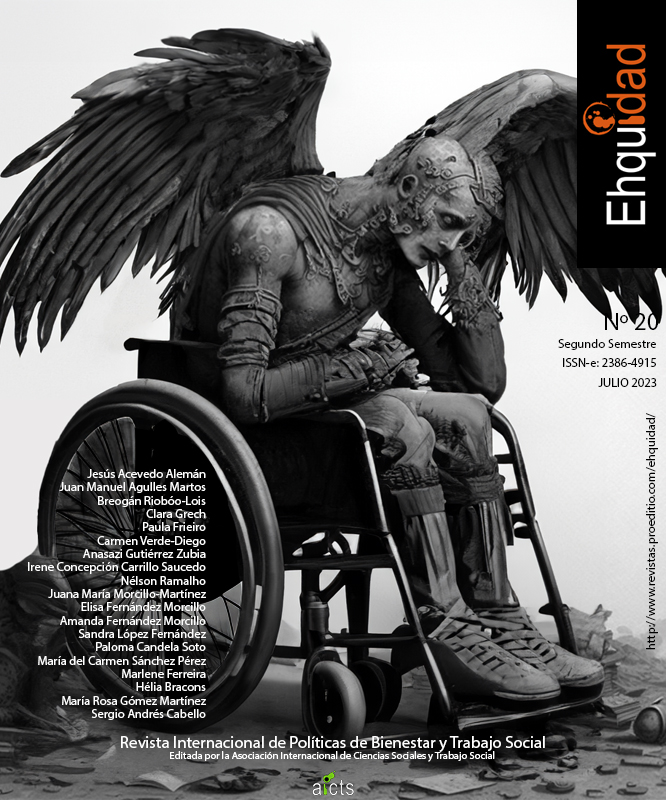Exploration of masking in autistic women and the presence of anxious and depressive symptoms.
DOI:
https://doi.org/10.15257/ehquidad.2023.0014Keywords:
Autism, gender, masking, depression, anxietyAbstract
Autism in women is a relatively new research phenomenon, this considering that research on the topic has been focused on men from the beginning (Gould, 2017). It was not until recently that was considered the existence of women on the autism spectrum, this has resulted in women being diagnosed even less at similar levels of autistic traits (Leedham, et. al., 2019), also, the social expectation related to gender had make that autistic women mask more their trats than autistic men (Hull, et. al., 2019), the previously mentioned adds to the reasons for a late diagnosis in women. The objective of the present study was to know the level of masking in a population of 37 autistic women without intellectual disability and their age of diagnosis and presence of symptoms of depression and anxiety. The study was descriptive, non-experimental and cross-sectional. A semi-structured interview was conducted where the sociodemographic data and details of the diagnosis were identified. It was used an elaborated questionary to identify the autistic masking, the Beck Anxiety Inventory (BAI; Beck 1988) and the Beck Depression Inventory 2 (BDI-2; Beck, 1996). In the results obtained, it was found that the 91.9% of the mask the autistic traits; in addition, 2.7% was diagnosed with depression, 8.1% with anxiety and 78.4% with both anxiety and depression.
Downloads
References
Asociación Psiquiátrica Americana - APA. (2013). Manual diagnóstico y estadístico de trastornos mentales (5th ed.). https://bit.ly/3oByxHW
Beck, A. T., Steer, R. A., & Brown, G. (1996). Beck Depression Inventory–II (BDI-II) [Database record]. APA PsycTests. https://doi.org/10.1037/t00742-000
Beck, A. T., Epstein, N., Brown, G., & Steer, R. A. (1988). An inventory for measuring clinical anxiety: Psychometric properties. Journal of Consulting and Clinical Psychology, 56(6), 893–897. https://doi.org/10.1037/0022-006X.56.6.893
Bonney, E., Abbo, C., Ogara, C., Villalobos, M. E., & Elison, J. T. (2021). Sex differences in age of diagnosis of autism spectrum disorder: Preliminary evidence from Uganda. Autism Research, 15(1), 183–191. https://doi.org/10.1002/aur.2645
Centers for Disease and Control prevention - CDC. (2020). Data & Statistics on Autism Spectrum Disorder. https://www.cdc.gov/ncbddd/autism/data.html
Dean, M., Harwood, R. & Kasari, C. (2016). The art of camouflage: Gender differences in the social behaviors of girls and boys with autism spectrum disorder. Autism, 21(6), 678–689. https://doi.org/10.1177/1362361316671845
Hull, L., Mandy, W., Lai, M.-C., Baron-Cohen, S., Allison, C., Smith, P., & Petrides, K. V. (2018). Development and Validation of the Camouflaging Autistic Traits Questionnaire (CAT-Q). Journal of Autism and Developmental Disorders, 49(3), 819–833. https://doi.org/10.1007/s10803-018-3792-6
Hull, L., Lai, M., S. Baron-Cohen, Allison, C., Smith, P. L., Petrides, K., & Mandy, W. (2019). Gender differences in self-reported camouflaging in autistic and non-autistic adults. Undefined; https://www.semanticscholar.org/paper/Gender-differences-in-self-reported-camouflaging-in-Hull-Lai/3b9caace6f44aefaccc1064510b1ff7649fe8633
Hull, L., Petrides, K. V., & Mandy, W. (2020). The Female Autism Phenotype and Camouflaging: A Narrative Review. Review Journal of Autism and Developmental Disorders, 7(4), 306–317. https://doi.org/10.1007/s40489-020-00197-9
Lai, M. C. & Baron-Cohen, S. (2015). Identifying the lost generation of adults with autism spectrum conditions. The Lancet Psychiatry, 2(11), 1013–1027. https://doi.org/10.1016/s2215-0366(15)00277-1
Lai, M. C., Lombardo, M. V., Auyeung, B., Chikrabarti, B. y Baron-Cohen, S. (2015). Sex/gender differences and autism: Setting the scene for future research. Journal of the American Academy of Child and Adolescent Psychiatry (JAACAP).
Lai, M. C., Lombardo, M. V., Ruigrok, A. N., Chakrabarti, B., Auyeung, B., Szatmari, P., Happé, F., & Baron-Cohen, S. (2016). Quantifying and exploring camouflaging in men and women with autism. Autism, 21(6), 690–702. https://doi.org/10.1177/1362361316671012
Leedham, A., Thompson, A. R., Smith, R., & Freeth, M. (2019). “I was exhausted trying to figure it out”: The experiences of females receiving an autism diagnosis in middle to late adulthood. Autism, 24(1), 135–146. https://doi.org/10.1177/1362361319853442
McCrossin, R. (2022). Finding the True Number of Females with Autistic Spectrum Disorder by Estimating the Biases in Initial Recognition and Clinical Diagnosis. Children, 9(2), 272. https://doi.org/10.3390/children9020272
Milner, V., McIntosh, H., Colvert, E., & Happé, F. (2019). A Qualitative Exploration of the Female Experience of Autism Spectrum Disorder (ASD). Journal of Autism and Developmental Disorders, 49(6), 2389–2402. https://doi.org/10.1007/s10803-019-03906-4
National Autistic Society - NAS. (2022). Autistic women and girls. Autism.org.uk. https://www.autism.org.uk/advice-and-guidance/what-is-autism/autistic-women-and-girls
Perry, E., Mandy, W., Hull, L., & Cage, E. (2021). Understanding Camouflaging as a Response to Autism-Related Stigma: A Social Identity Theory Approach. Journal of Autism and Developmental Disorders. https://doi.org/10.1007/s10803-021-04987-w
Sanz, J., García-Vera, P., & Fortún, M. (2012). EL “INVENTARIO DE ANSIEDAD DE BECK” (BAI): PROPIEDADES PSICOMÉTRICAS DE LA VERSIÓN ESPAÑOLA EN PACIENTES CON TRASTORNOS PSICOLÓGICOS. Behavioral Psychology / Psicología Conductual, 20, 563–583. https://www.behavioralpsycho.com/wp-content/uploads/2019/08/05.Sanz_20-3oa.pdf
Sanz, J., Gutiérrez, S., Gesteira, C., & Paz García-Vera, M. (2014). CRITERIOS Y BAREMOS PARA INTERPRETAR EL “INVENTARIO DE DEPRESIÓN DE BECK-II” (BDI-II). Behavioral Psychology / Psicología Conductual, 22, 37–59. https://www.behavioralpsycho.com/wp-content/uploads/2019/08/03.Sanz_22-1oa.pdf












